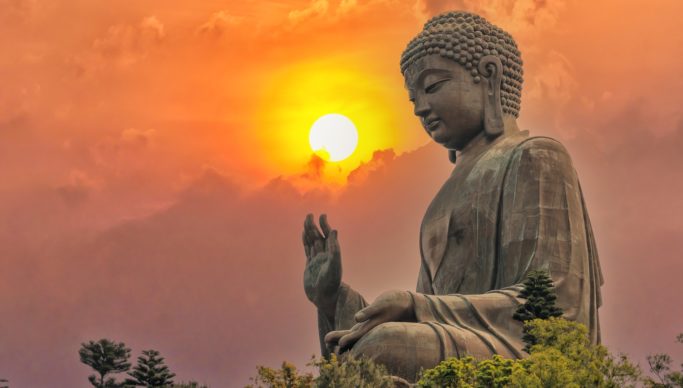
The Gifts of Buddhism
- By Deirdre Pelphrey --
- 09 Sep 2022 --
2,500 years ago, Gautama Sakyamuni—more familiar to us as the Buddha—was not handed wisdom by an angel and was not spoken to face to face by the Creator. Neither did he have a divine vision nor a miraculous burst of power. When his followers demanded to know what he was—for he most certainly was no ordinary man, yet he insisted he was neither god, angel, nor saint—he answered, “I am awake.” Hence his title—Buddha—comes from the Sanskrit, budh meaning to wake up and to know. So Buddha means the “Enlightened One” or the “Awakened One.”
Buddha achieved enlightenment and salvation through his own diligence and discipline. Buddhism’s great gift, then, was the idea of achieving salvation on one’s own, without divine intervention, but through good works, physical and spiritual labor and meditation. Bound to neither tradition nor ritual, nor dependence on higher castes, nor even a superior divine will, but rather to wisdom, pragmatism and discipline, Buddhism was the first major self-help religion and the first whose portals of wisdom were thrown open to all, regardless of rank or caste, and written in the vernacular of the people it served. It also is a religion that relies on data rather than faith. Buddha urged his followers to take nothing as true unless it was true in their own experience. “Do not go by reasoning, nor by inferring, nor by argument,” he said. The seeker of truth must “know for himself.”
Buddha’s democratic vision of spiritual release for all—not just for a select elite—swept through two-thirds of the population of the world and civilized India, China, Japan and the Near East. Buddhist monks brought culture and its technologies—written language and such arts as lacquer and silk-making to Japan as an example—using the well-trod paths of trade to bring light to what had been barbarisms.
Buddha said, “One thing I teach: suffering and the end of suffering…It is just Ill and the ceasing of Ill that I proclaim.” He further specified that “hunger is the worst kind of illness” and “the gift of food is the gift of life.”
Buddhists today follow the Teacher’s words and accordingly there are now 1,765 Buddhist charities and non-profits in the United States and many additional operating on a global level to reduce hunger, the “worst kind of illness.”
Buddhist Global Relief and the Tzu Chi Foundation are two such that feed the thousands and tens of thousands, depending on volunteer help to provide not just relief from chronic hunger and malnutrition, but disaster assistance, medical aid and environmental work such as recycling as well.
Buddha taught that “In giving food, one gives five things to the recipients: one gives life, beauty, happiness, strength, and mental clarity. In giving these five things, one in turn partakes of life, beauty, happiness, strength, and mental clarity, whether in this world or in the heavenly realm.”
The gifts of Buddhism—now one of the world’s largest religions—go far beyond feeding the hungry. For two-and-a-half millennia it has also nourished cultures by making the goal of spiritual freedom—with its attendant wisdom, beauty, strength and joy—an attainable one for everyone. And in that sense, Buddhism truly feeds the spiritual hunger of us all.



















